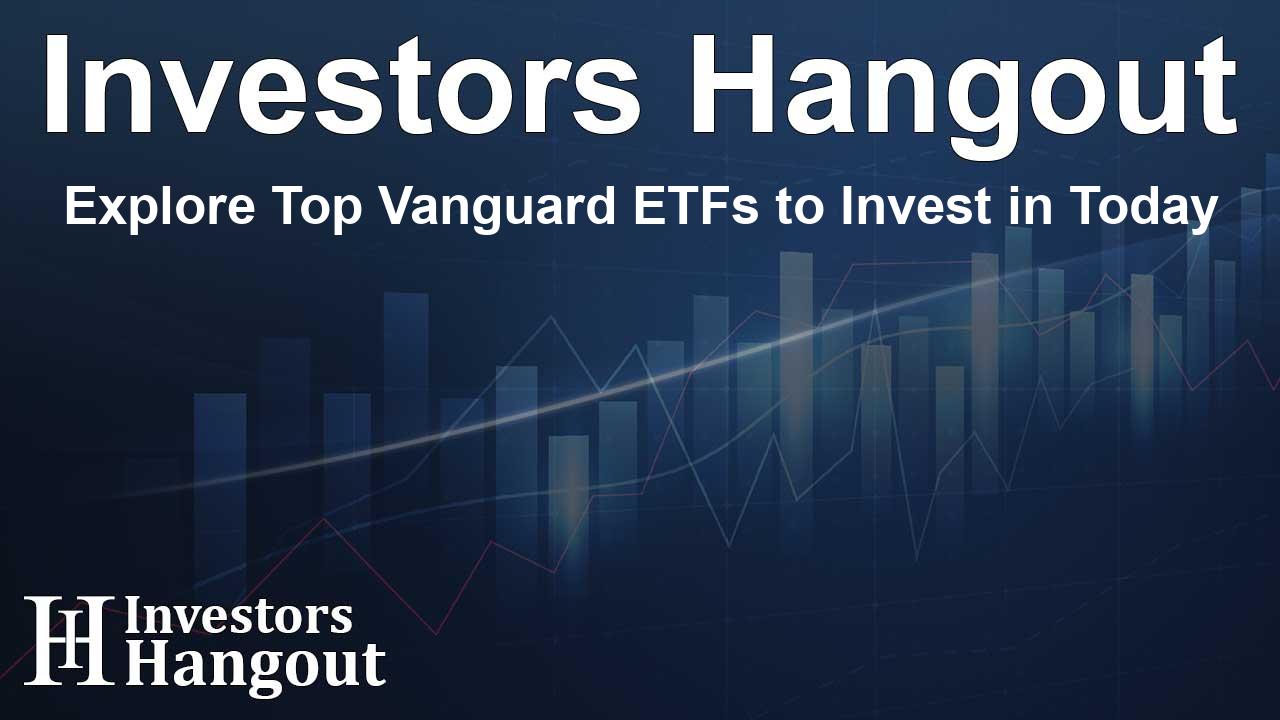Understanding Exchange-Traded Funds
Exchange-traded funds (ETFs) represent one of the most notable advancements in the world of investing. They allow investors to purchase shares that collectively hold a variety of related stocks, often aligned with a specific index. This investment tool democratizes access to a diversified portfolio, making it simpler for individuals to participate in the stock market.
Vanguard: A Leader in ETF Management
Vanguard is recognized as one of the top management companies for ETFs. Founded by Jack Bogle, the firm has had a significant influence on the investment landscape, offering a wide variety of funds tailored to meet the needs of diverse investors. Today, investors have a plethora of Vanguard ETFs to choose from, each designed with distinct strategies and market exposures.
Why Choose Vanguard ETFs?
One key reason investors gravitate towards Vanguard is the reputation for low costs and solid performance. ETF investors enjoy the benefits of reduced fees, which can significantly enhance long-term returns. Moreover, Vanguard’s extensive research and resources empower investors to make informed choices aligned with their goals.
Spotlight on a Vanguard ETF to Consider
Amongst the various options available, the Vanguard Financials ETF (NYSEMKT: VFH) stands out as a compelling choice for investors seeking exposure to the financial sector. This ETF tracks the MSCI US benchmark, incorporating a mix of large-, mid-, and small-cap stocks.
In terms of valuation, the Vanguard Financials ETF is currently trading at a price-to-earnings (P/E) ratio of 16.6—substantially lower than the Vanguard 500 ETF’s 29 P/E. This indicates that the S&P 500 is approximately 60% more expensive than this financials fund, presenting an attractive entry point for investors.
Market Dynamics Favoring Financial Stocks
The financial sector often experiences lower valuations within an expanding economy due to cyclical growth patterns. Falling interest rates, which can initially pose challenges to banks by compressing net interest margins, should encourage borrowing, stimulating economic growth. As the economy strengthens, financial institutions benefit from bolstered demand for loans, mergers, and other financial services, enhancing profit margins overall.
The Vanguard Financials ETF offers a well-rounded portfolio, incorporating not just banking stocks, but also blue-chip names such as Warren Buffett's Berkshire Hathaway, along with Visa and Mastercard. With a favorable economic outlook and anticipated demand for consumer finance products, this ETF presents an appealing opportunity.
A Vanguard ETF to Avoid
Conversely, the Vanguard Consumer Staples ETF (NYSEMKT: VDC) is one to approach with caution. While this ETF historically benefitted from consumer behavior during economic downturns, the present economic climate may not favor its high valuations.
Challenges in Consumer Staples
The Consumer Staples ETF focuses on established firms like Coca-Cola and Procter & Gamble, which thrive in recession-prone environments. However, its P/E ratio stands at 25, placing it precariously close to that of the S&P 500 while lacking the growth potential exhibited by technology stocks such as Nvidia.
Investors may want to reevaluate holdings in this ETF, as major components of the fund—such as Procter & Gamble, Costco, and Walmart—show signs of inflated valuations with P/E ratios reaching upwards of 41. This suggests a potentially limiting upside, thereby making it wise for investors to consider holding off on new investments in this particular ETF for the time being.
Investing Wisely for the Future
The lesson here is to remain vigilant in identifying lucrative investment opportunities and to differentiate between funds that align with positive economic trends versus those that may be overpriced. Considering current market conditions, the Vanguard Financials ETF is seen as a strong candidate for focused investment, while the Consumer Staples ETF should warrant scrutiny and cautious consideration.
Frequently Asked Questions
What are the benefits of investing in an ETF?
ETFs offer diversification, lower costs, and ease of trading, making them an appealing option for both seasoned investors and beginners.
Why is the Vanguard Financials ETF recommended?
The Vanguard Financials ETF (NYSEMKT: VFH) is recommended due to its low P/E ratio and potential exposure to a strengthening economy.
What should I consider before investing in ETFs?
Before investing, always evaluate the fund's performance, expense ratios, the sectors represented, and general market conditions.
Are all Vanguard ETFs a good investment?
No, while many Vanguard ETFs offer strong value, some may not align with current market trends and economic forecasts, which requires careful analysis.
How does the price-to-earnings ratio affect my investment?
A lower P/E ratio can indicate potential undervaluation, suggesting a better entry point, while higher ratios may suggest overpricing, warranting caution.
About Investors Hangout
Investors Hangout is a leading online stock forum for financial discussion and learning, offering a wide range of free tools and resources. It draws in traders of all levels, who exchange market knowledge, investigate trading tactics, and keep an eye on industry developments in real time. Featuring financial articles, stock message boards, quotes, charts, company profiles, and live news updates. Through cooperative learning and a wealth of informational resources, it helps users from novices creating their first portfolios to experts honing their techniques. Join Investors Hangout today: https://investorshangout.com/
Disclaimer: The content of this article is solely for general informational purposes only; it does not represent legal, financial, or investment advice. Investors Hangout does not offer financial advice; the author is not a licensed financial advisor. Consult a qualified advisor before making any financial or investment decisions based on this article. The author's interpretation of publicly available data shapes the opinions presented here; as a result, they should not be taken as advice to purchase, sell, or hold any securities mentioned or any other investments. The author does not guarantee the accuracy, completeness, or timeliness of any material, providing it "as is." Information and market conditions may change; past performance is not indicative of future outcomes. If any of the material offered here is inaccurate, please contact us for corrections.
